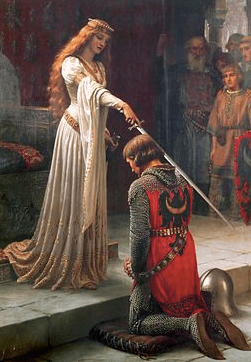
Earlier, the parallel of Arthur Dayne to Sir Lancelot was explored. Elia was posited in the role of Gwenhwyfar, with Lyanna Stark in the role of Elaine. In keeping with Elaine’s theme of disguise, Lyanna transforms into Gwenhwyfar to Rhaegar’s evolving Lancelot. The offspring of R+L, at once Arthur to their Uther and Ygrain, can thus also be viewed as the embodiment of Galahad, as we will see. Yet this scenario leaves discussions of Elia at unsatisfactory loose ends. Inspired by a thorough re-read of all references, we come back to themes of Gwenhwyfar in the character of Elia Martell.
Gwenhwyfar’s story has earth goddess themes, with links to the early Welsh triple goddess and strong parallels to Persephone. The name Gwenhwyfar can be translated to “White Fay (Spirit)” which supports her supernatural origin. Most of the earliest references to the character come from the Welsh triads where, as the three queens of Arthur indicate, we find a strong association with the triple goddess. In the story of Culhwch and Olwen she is referenced as one of Arthur’s “otherworld” weapons, while several other triads reference her involvement in the battle of Camlann and her “faithlessness” as a wife. Speculation surrounding some of these references is that Gwenhwyfar is representative of Arthur’s sovereignty, which is in keeping with divine origins.
Elia Martell is described by Barristan Selmy as:
a good woman … kind and clever, with a gentle heart and a sweet wit. (ADwD, chapter 23)
Her marriage with Rhaegar was marked by “fondness” rather than passion, most likely the union of a well schooled prince and princess who, while they didn’t choose each other, had no real complaints of each other. Aerys, in his paranoia, may have felt he needed the union with Dorne to keep them faithful, in much the same way a British king may have “needed” to wed a representative of the British earth goddess. The characterization of Gwenhwyfar as a faithless wife in the triads seems to come from nowhere, unless one considers the practice of the representative of sovereign goddess taking an annual mate. While on the one hand this furthers Gwenhwyfar’s association with a divine character, it also opens the door to later tales of Gwenhwyfar’s infidelity with Lancelot and therefore the hinted parallel of Elia and Arthur to Gwenhwyfar and Lancelot.
What makes this parallel fascinating, and even possible, is that there is very little agreement in the sources about the nature of Gwenhyfar and Lancelot’s infidelity (see the variation in ideas of courtly love, for instance) and not much consistency in portrayal of their characters. Gwenhwyfar is alternately strong, passive, assertive, insipid, judgmental, gentle, shrewish, maternal, treacherous and tragic. Similarly, there is a lot of confusion about the character of Elia Martell among the ASoIaF fandom. Much of the characterization of Elia Martell is highly reminiscent of Gwenhwyfar: she is sweet, gentle, maternal (though of uncertain childbearing ability) and inspires great love and loyalty among those who knew her, but is also assumed to be weak or passive because of her husband’s actions. Some assume she drove Rhaegar away with her feebleness, others suggest she passively accepted being set aside. While on the one hand the parallel supports an earthy, maternal image for both, it also becomes very much about the lack of information and confusion about the motives and character of each woman.
After a thorough examination of the Arthurian source material pertaining to Arthur and Gwenhwyfar, one is left with the distinct impression that there is much that remains untold, hidden in the mists of time. Similarly, we must reach the same conclusion about Rhaegar and Elia: we don’t have sufficient insight into their private lives to pass character judgments. Even what we know of the outcome remains shrouded in mystery. At the end of the day, there’s room to believe Elia had opinions and a strong identity of her own and to accept that there is much and more we don’t yet know about R+E and suspend judgment, as we indeed must for Arthur and Gwenhwyfar.
Hello mate nicee blog